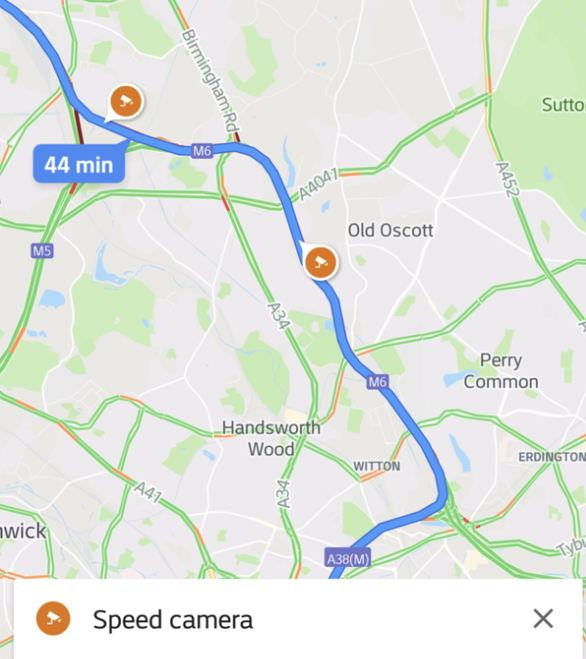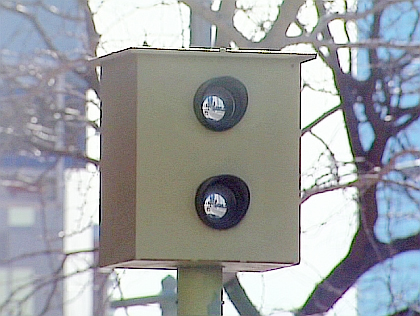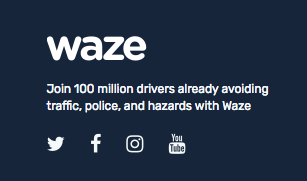There's a slap for that.
The NYPD is demanding that Google remove a just-added feature to its omnipresent Maps program that tips off drivers to the locations of speed cameras, Streetsblog has learned.
Google added the speed camera notification as part of its effort to incorporate some of the crowd-sourced features of Waze, which the tech giant bought in 2013. The Waze app shows the locations of police checkpoints as well as what some drivers call "speed traps," but what police believe are life-saving enforcement efforts.
The NYPD sent its "cease-and-desist" letter to Google over the weekend — after Streetsblog asked officials' about the Waze feature that allows drivers to inform each other of police roadblocks.
"The NYPD has become aware that the Waze Mobile application ... currently permits the public to report DWI checkpoints throughout New York City and map these locations," reads the letter by the NYPD's Acting Deputy Commissioner for Legal Matters Ann Prunty. "Accordingly, we demand that Google LLC, upon receipt of this letter, immediately remove this function from the Waze application."
The letter does not specifically mention Google Maps' new speed camera notification, but the broad language could be construed to cover such information as well.
The letter caps a brief window of time during which the public was not even aware of the new Google Maps feature and the NYPD writing its warning letter. Commuters said they only noticed the speed camera warnings late last week.
"The map alerted me, 'Speed camera up ahead,'" said Ed Janoff, a former planner with the Department of Transportation who is now a project director at Street Plans, recalling the notification he received near Francis Lewis Boulevard in Queens. "The tech tools are getting better at supplying the data drivers want in order to help them speed and run red lights without getting caught by the city's scant few enforcement cameras."
Google did not announce the new feature publicly, but it was first discovered by the website, AndroidPolice.com. There had been some coverage in the tech press, which suggested that drivers would be enthusiastic about the changes.

"Google Maps Wants to Help you Avoid that Speeding Ticket," read a headline in Mashable. The outlet reported that Google Map users have been able to report "speed traps" since late last year, but the app didn't enable the feature until now.
"The speed traps will have orange camera icons so drivers can make sure to maintain the speed limit around these areas," Elite Daily reported. "The best part? Drivers will receive audio notifications when approaching speed traps."
The best part? That's not how the NYPD sees it.
"Individuals who post the locations of DWI checkpoints may be engaging in criminal conduct since such actions could be intentional attempts to prevent and/or impair the administration of the DWI laws and other relevant criminal and traffic laws," the letter stated. "The posting of such information for public consumption is irresponsible since it only serves to aid impaired and intoxicated drivers to evade checkpoints and encourage reckless driving. Revealing the location of checkpoints puts those drivers, their passengers, and the general public at risk.
"The NYPD will pursue all legal remedies to prevent the continued posting of this irresponsible and dangerous information."
The Waze police checkpoint feature has been under fire for years, with a national sheriffs group and the NYPD's sergeants union demanding that it be deactivated in 2015, days after Brooklyn police officers Wenjian Liu and Rafael Ramos were ambushed in their squad car by a killer who had the Waze app on his phone.
Nothing came of those demands — though in 2017, France made it illegal for apps to reveal the locations of speed cameras and radar — until this weekend's NYPD letter.
Street safety activists, such as Jonathan Rogers (tweet below), have long complained about how the Waze feature undermined enforcement tools and strategies that took years to implement.
For the record, the Waze app does not feature clinking beer mugs, but the company does proudly boast that its service has 100 million drivers "avoiding traffic, police and hazards."
The kind of attitude about police enforcement was disconcerting from the popular Waze, but it is particularly alarming when deployed by Google Maps, which is far more widely used than any other navigation system.
A 2017 study revealed that Google Maps is the navigation app of choice of 67 percent of smartphone users who say they use a digital map. The next-closest app in popularity was Waze at a mere 12 percent.
As such, safety activists are concerned that speed camera effectiveness is about to decline dramatically. Members of Families for Safe Streets, for example, spent much of the summer staging almost-daily rallies in support of New York City's speed camera program, which the state legislature allowed to expire before the City Council and Gov. Cuomo worked out a deal to restore 140 school-zone systems — a pact that remains in effect today.
The governor has proposed expanding the program to 290 cameras — far short of the 1,000-plus systems activists wanted.
But no matter how many cameras are installed, they will fail to do the job if scofflaw drivers are alerted to their location, said Amy Cohen of Families for Safe Streets.
"With so few traffic safety cameras operating, it is deeply disturbing that Google is making it easier for drivers to identify and choose routes where speeding is rarely enforced," Cohen told Streetsblog. "We need our state and city lawmakers to allow for a drastic increase in life-saving traffic safety cameras, like speed-, red light- and intersection cameras. If Google wants to avoid getting blood on their hands, they should become strong active partners in the fight for more life-saving traffic safety cameras in New York."
Janoff, the transportation planner, took a broader view.
"You could argue that the warnings are helpful because ... they are more likely to prevent speeding and red light running in the first place — and at the locations where the city has deemed a high enough priority that they warrant camera enforcement," he said. "But given that more than 99 percent of streets have no camera enforcement, you are effectively letting drivers know where they are and aren't likely to get caught breaking the law, which seems counter to the whole mission of making streets safer by reducing illegal driving behavior."
Neither Google nor Waze answered multiple requests for comment from Streetsblog.
The NYPD letter is embedded below.







